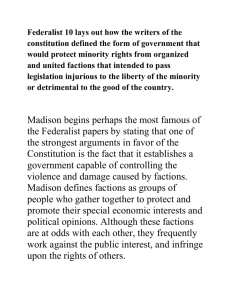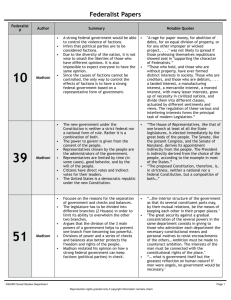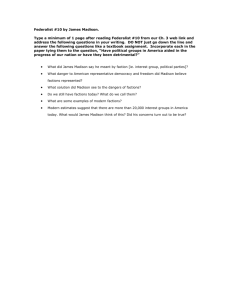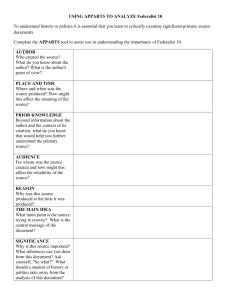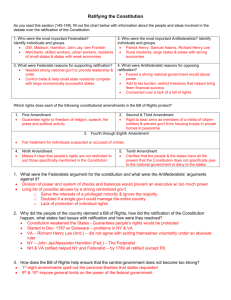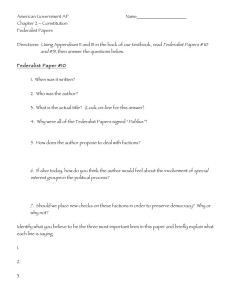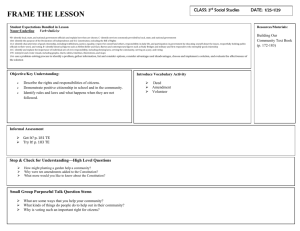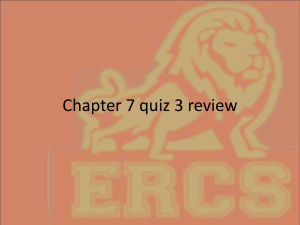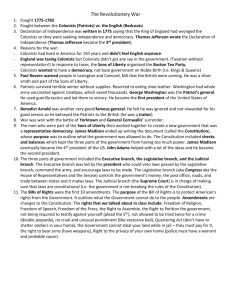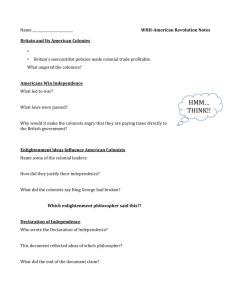Politics of the American Founding
advertisement
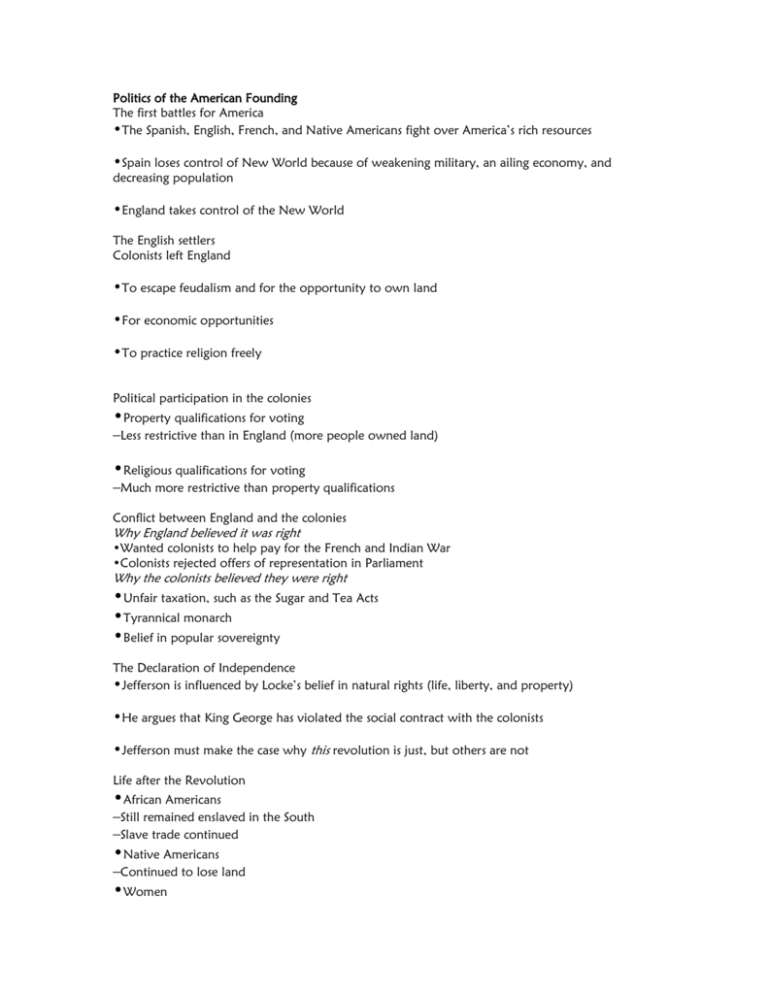
Politics of the American Founding The first battles for America •The Spanish, English, French, and Native Americans fight over America’s rich resources •Spain loses control of New World because of weakening military, an ailing economy, and decreasing population •England takes control of the New World The English settlers Colonists left England •To escape feudalism and for the opportunity to own land •For economic opportunities •To practice religion freely Political participation in the colonies •Property qualifications for voting –Less restrictive than in England (more people owned land) •Religious qualifications for voting –Much more restrictive than property qualifications Conflict between England and the colonies Why England believed it was right •Wanted colonists to help pay for the French and Indian War •Colonists rejected offers of representation in Parliament Why the colonists believed they were right •Unfair taxation, such as the Sugar and Tea Acts •Tyrannical monarch •Belief in popular sovereignty The Declaration of Independence •Jefferson is influenced by Locke’s belief in natural rights (life, liberty, and property) •He argues that King George has violated the social contract with the colonists •Jefferson must make the case why this revolution is just, but others are not Life after the Revolution •African Americans –Still remained enslaved in the South –Slave trade continued •Native Americans –Continued to lose land •Women –Lost the ability to vote and the previous limited opportunities to participate in politics The Articles of Confederation •Established a “firm league of friendship” •Created a confederacy giving power to the states •Federal government had few powers and limited ability to carry out those powers Provisions in the Articles •A national government with a Congress empowered to make peace, coin money, appoint officers for an army, control the post office, and negotiate with Indian tribes •One vote in the Continental Congress for each state regardless of size •The vote of nine states to pass any measure; amendments had to be unanimous •Delegates selected to the Congress by their respective state legislatures •Because of the fear of a tyrannical ruler, no executive was created and the national government was quite weak Problems with the Articles •No executive to administer the government (no real leader) •No power to tax without states’ consent (difficult to do anything like establish a national army without money) •No authority to regulate commerce (trade between states became chaotic because states were using their own money; continental dollars were worth nothing) •Congress could pass laws but had little power to execute or enforce them The Constitutional Convention •Described as “an assembly of demigods” •Called to revise the Articles of Confederation after concern over Shays’s Rebellion •Meetings held in secret •Created a whole new government •Major debate remained over how much power the federal government should have Two competing plans The Virginia Plan •Bicameral legislature •Representation in both based on population •One house elected by the people; one house elected by state legislatures •Single executive chosen by Congress •Favored by large states The New Jersey Plan •Unicameral legislature •Equal representation •Representatives elected by state legislatures •Multi-person executive •Favored by small states The Great Compromise •Bicameral legislature –House of Representatives based on population and chosen by the people –Senate based on equal representation and chosen by the state legislatures •Single executive chosen by the electoral college •Federal court system The battle over ratification Federalists •Supported ratification of the Constitution •Wanted strong central government •Concerned about security and order •E.g., Madison, Hamilton, Jay Anti-Federalists •Opposed ratification of the Constitution •Wanted states to have power over the federal government •Corruption best kept in check at the local level •E.g., Samuel Adams, Patrick Henry The Federalist Papers •Written by Madison, Hamilton, and Jay under the pen name Publius •Called for ratification of the Constitution •Published in New York papers to persuade legislators to ratify the Constitution •Among the best known: Federalist Nos. 10, 51, and 78 Federalist No. 10 •Madison warned against dangers of factions •The causes of factions cannot be controlled (that infringes on liberty); must control the effects of factions •Effects of factions could best be controlled by a republic Federalist No. 10, cont’d. A republic could best control factions: •Representation would dilute the effects of factions •A large territory would make it difficult for one faction to become a majority •In a large territory, it would be difficult for people who shared common interests to find each other Ratification of the Constitution •Required support of nine of the thirteen state legislatures •Small states were quick to support the Constitution because of the inclusion of the Senate •Eventually all thirteen states ratified it (Rhode Island the last in 1790) The citizens and the founding •Competing elites –Elites weren’t united in their views about a new government •The rise of the “ordinary” citizen –Development of citizenship as we know it today Three elements of citizenship •Citizenship should rest on consent. •There should not be grades or levels of citizenship. •Citizenship should confer equal rights on all citizens.
